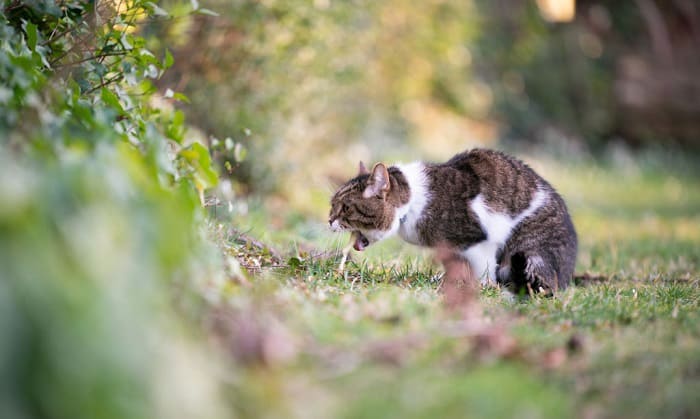For many cat owners, seeing their cat vomit undigested food can be alarming. While occasional vomiting might not be a cause for concern, understanding why this happens is crucial, especially if it occurs frequently. This article delves into common reasons behind such episodes and guides when to seek veterinary care.
Overview of Cat Vomiting
- Normal vs. Abnormal Vomiting: Occasional vomiting in cats can be normal, especially in the case of hairballs. However, frequent or chronic vomiting, particularly of undigested food, can indicate a health problem.
- The Process of Vomiting: Vomiting is a complex reflex involving the brain, stomach, and intestines. It’s often a protective mechanism for the body to expel harmful substances.
Common Reasons for Vomiting Undigested Food
- Eating Too Quickly: When cats eat too fast, they may swallow air along with their food, leading to the regurgitation of undigested food. Slowing down their eating pace can help; this can be achieved through puzzle feeders or smaller, more frequent meals.
- Dietary Indiscretion: Changes in diet or eating something inappropriate can upset a cat’s stomach, resulting in vomiting. Gradual dietary changes are recommended to avoid such issues.
- Hairballs: Especially in long-haired breeds, hairballs can lead to vomiting. Regular grooming and specialized hairball-control diets can help manage this.
- Food Intolerances or Allergies: Some cats may have allergies or intolerances to certain food ingredients, which can cause vomiting. Identifying and eliminating these ingredients is crucial.
Health Conditions That Cause Vomiting
- Gastrointestinal Issues: Conditions like gastritis, inflammatory bowel disease, or infections can cause vomiting. These may require dietary management, medications, or other treatments.
- Other Health Concerns: Conditions such as kidney disease, hyperthyroidism, or even stress can manifest as vomiting. It’s essential to rule out these conditions with the help of a veterinarian.
When to Seek Veterinary Care
- Recognizing Serious Symptoms: Persistent vomiting, lethargy, diarrhea, blood in vomit, or any signs of distress call for immediate veterinary attention.
- Diagnostic Tests and Treatments: A veterinarian may recommend tests like blood work, X-rays, or ultrasound to diagnose the underlying cause. Treatment will depend on the diagnosis and may include dietary changes, medications, or even surgery in severe cases.
Preventive Measures and Home Care
- Dietary Management: Feed a balanced diet appropriate for your cat’s age, health status, and lifestyle. Small, frequent meals can prevent the stomach from becoming overly full, reducing the risk of vomiting.
- Environmental Enrichment: A stress-free environment can minimize anxiety-related vomiting. Provide toys, scratching posts, and safe spaces for your cat.
- Regular Grooming: Regular brushing can reduce the amount of hair ingested during grooming, decreasing the likelihood of hairball-induced vomiting.
Conclusion
Vomiting undigested food in cats can stem from various causes, ranging from eating habits to serious health issues. Monitoring your cat’s behavior and being attentive to their dietary needs are key steps in managing this problem. Remember, when in doubt, always consult a veterinarian to ensure the health and well-being of your feline friend.

Jane Doe, a veterinarian with over 10 years of experience, combines her deep knowledge of animal health with a passion for pet welfare at PetsPonder.com. With a DVM degree and a commitment to the latest in veterinary science, Jane Doe offers reliable, compassionate advice to help pet owners make informed decisions for their furry companions.

Leave a Reply